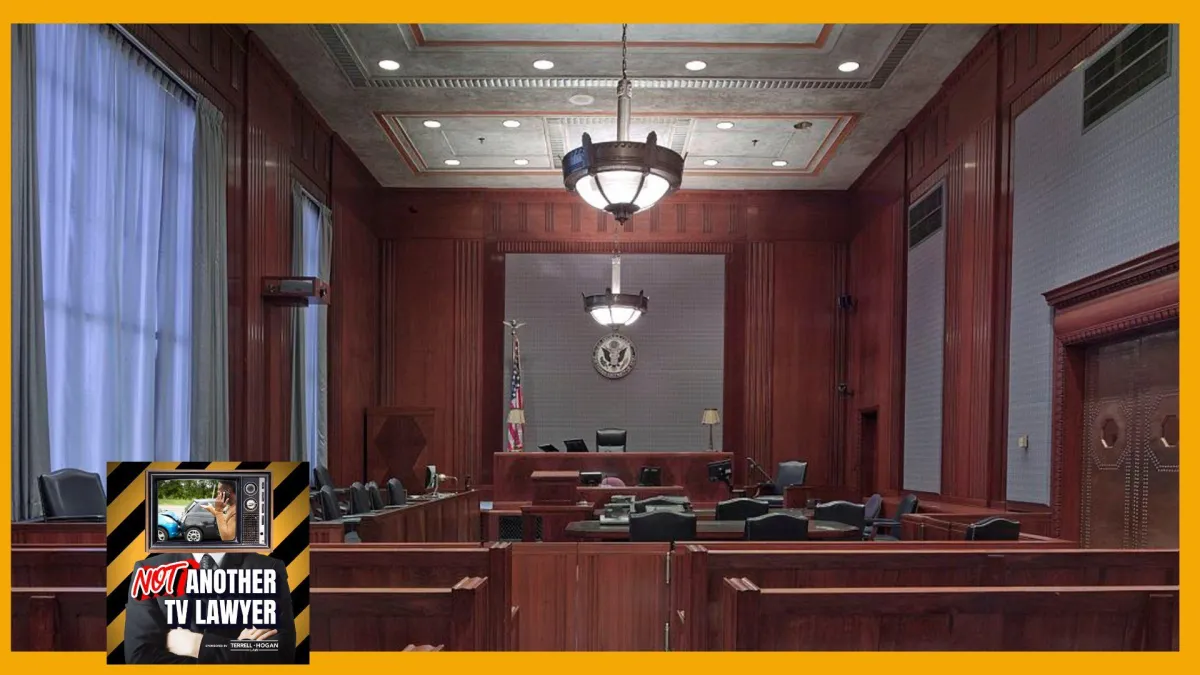— PORTFOLIO
Featured WORK
Celebrate Creativity: Showcasing our Client Work
At Mix Theory Studios, we take immense pride in showcasing the exceptional work we've done with our clients. From reimagining music albums to producing national Ad campaigns featured during the World Series, our portfolio reflects our commitment to quality and creativity. Each project is a testament to our collaborative approach and dedication to bringing our clients' visions to life. Join us in celebrating and envisioning your own project's potential.
Client Works

Going to Court
Navigating Litigation in Auto Accidents: Insights from Not Another TV Lawyer Podcast
If you're navigating the often daunting world of litigation following an auto accident, you're not alone. We understand how overwhelming the whole process can be, and that's why our latest podcast episode is dedicated to shedding light on this complex topic. In this blog post, we highlight some key takeaways from our discussion, hosted by Chris Shakib, an attorney at Terrell Hogan, alongside Jessica Hall, his seasoned paralegal.
Watch the Video
Episode 10: What to Expect When You File a Lawsuit
In this Season Finale episode of 'Not Another TV Lawyer,' hosts Chris Shakib and Jessica Hall from the law firm Terrell Hogan, dive into the intricacies of litigation in auto accident cases. They discuss the importance of understanding statutes of limitations, particularly the recent change in Florida from four years to two years. They highlight the crucial role of pre-suit demands, the need for consistent client treatment and communication, and the detailed processes involved once a lawsuit is filed, including discovery and depositions. Ultimately, honesty and thorough preparation are the best support for personal injury clients in navigating the lengthy litigation process to ensure the best outcomes for their clients.
Video time-stamps are available at the end of this blog in the Episode Notes.
Preparing Personal Injury Clients for Litigation: A Roadmap for Auto Accident Cases
Litigation can be a complex and intimidating process, especially for clients who have never been involved in a legal dispute. It becomes necessary when attempts to settle a case outside the court are unsuccessful. As Chris Shakib notes, "Litigation is what happens when pre-suit demands are unsuccessful, and the case actually has to go into court."
Auto accidents, fortunately, have a higher probability of settling pre-suit compared to other cases like medical malpractice due to their nature, though they can still escalate to litigation if damages are severe or if insurance negotiations stall.
When litigation becomes necessary, thorough preparation is key to ensuring that personal injury clients feel confident and capable as they navigate each stage of the legal journey. From discovery and interrogatories to depositions and trial, effective communication and preparation can make all the difference in achieving a favorable outcome.
Here’s a step-by-step guide to preparing a personal injury client for litigation.
Understanding the Litigation Process
A crucial first step in any litigation is understanding the statute of limitations, which varies by state. In 2023, Florida reduced its statute of limitations from four years to two. Chris explains, "If a lawsuit is not filed within two years of the date of the accident, that crash—that’s the end of it. There’s nothing left to do. There is no claim." This highlights the importance of timely legal action following an accident.
At Terrell Hogan, Jessica Hall explained how they utilize advanced case management systems like Clio to track critical deadlines and how these tools assist with statutory deadlines: "I calendar the statute of limitations, and then we do 30, 60, 90, 120-day reminders, so that that gives us time to do something, or to follow up on something, or get something done." This proactive approach in tracking and managing deadlines is crucial to ensuring cases move forward without unexpected hiccups.
Then, it is important to prepare and educate clients on the litigation timeline and what they should expect. This timeline includes:
Discovery: Gathering evidence and exchanging information with the opposing party.
Interrogatories: Written questions requiring detailed responses under oath.
Depositions: Oral testimony recorded under oath before trial.
Trial: The final stage, where arguments and evidence are presented to a judge or jury.
Providing an overview helps clients feel informed and reduces anxiety about the unknown.
Navigating Discovery and Interrogatories
Discovery is a vital phase in litigation where both parties gather information about the case. Chris outlines its significance: "Discovery is how the parties in litigation find out about the case...we find out about, you know, the things we want to know about the defendant driver and the defendant’s car and the defendant’s insurance company.”
During discovery, both parties gather and share evidence to build their cases. This stage often includes:
Medical Records: Collecting and sharing documentation of injuries and treatments.
Accident Reports: Providing police or insurance records.
Witness Statements: Identifying and preparing witnesses who can support the case.
It also includes written questions (interrogatories) and requests for documentation that can be pivotal to a case's success. These formal, written questions are submitted by the opposing party and responses are submitted under oath. To prepare clients:
Review Questions Together: Go over each interrogatory to ensure accurate and thorough responses.
Stick to the Facts: Encourage clients to provide clear, truthful answers without speculation.
Highlight Key Details: Emphasize the importance of consistency between interrogatories and deposition testimony.
Honesty is paramount throughout litigation. Jessica Hall advises, "This is not the time to lie to your attorney. We don’t like surprises." Whether it's about past injuries or legal history, transparent communication builds a strong case and prevents damaging revelations later on.
Preparing for a Deposition
Depositions are an opportunity for the defense to gather sworn, detailed responses from involved parties. Chris emphasizes the need for preparation: "It’s malpractice for a client to ever show up for a deposition and not be prepared." A thorough prep session ensures that clients are ready, relaxed, and able to provide accurate, truthful responses that uphold their credibility.
Depositions can be a nerve-wracking experience for clients, as they must answer questions under oath from opposing counsel. Proper preparation can ease their concerns:
Mock Depositions: Conduct practice sessions to simulate the deposition process and identify potential areas of concern.
Teach Deposition Etiquette: Remind clients to listen carefully, pause before answering, and remain calm under pressure.
Avoid Overexplaining: Encourage concise answers—clients should stick to "yes," "no," or brief explanations unless more detail is specifically requested.
Address Tough Questions: Prepare clients for challenging questions and teach them how to remain composed and truthful.
Building Confidence, Emotional Support and Communication for Trial
Personal injury litigation can be emotionally taxing, especially for clients reliving a traumatic auto accident. If the case proceeds to trial, clients must be ready to testify and present their story effectively. Trial preparation includes:
Courtroom Familiarization: Take clients to the courtroom beforehand to acquaint them with the environment.
Testimony Preparation: Rehearse their direct examination and prepare them to handle cross-examination with poise.
Clarify Roles: Explain who will be present (judge, jury, attorneys) and what to expect during each phase of the trial.
Maintaining Open Communication: Check in regularly to address questions or concerns.
Setting Realistic Expectations: Be transparent about potential outcomes, timelines, and challenges.
Empathizing with Their Experience: Acknowledge their frustrations and stress, and provide reassurance that they are not navigating the process alone.
Encourage clients to remain authentic and let the evidence and their testimony speak for itself.
Collaboration Is Key
Effective litigation requires teamwork. Preparing a personal injury client for litigation is about more than just legal strategy—it’s about empowering clients to confidently share their story and seek justice. From discovery to trial, every stage of the process is an opportunity to strengthen the case and build trust between attorney and client.
By equipping clients with the knowledge, tools, and support they need, attorneys can help them navigate litigation with clarity and composure, ultimately improving their chances of securing the compensation they deserve.
Conclusion
In conclusion, navigating litigation in auto accident cases is a multi-step process requiring careful attention to detail and robust communication between clients and their legal team. At Terrell Hogan, we're committed to supporting our clients throughout this journey, ensuring they have the guidance and tools necessary to achieve a favorable outcome.
If you believe you might have a case or have questions about a lawsuit, feel free to reach out to Terrell Hogan at 904-632-2424. Thank you for reading, and we hope you tune in to our next episode of Not Another TV Lawyer.
For more information about our services, visit us at www.terrellhogan.com. Our expert team is here to assist with a range of legal issues, from auto accidents to business claims throughout the state of Florida.

Going to Court
Navigating Litigation in Auto Accidents: Insights from Not Another TV Lawyer Podcast
If you're navigating the often daunting world of litigation following an auto accident, you're not alone. We understand how overwhelming the whole process can be, and that's why our latest podcast episode is dedicated to shedding light on this complex topic. In this blog post, we highlight some key takeaways from our discussion, hosted by Chris Shakib, an attorney at Terrell Hogan, alongside Jessica Hall, his seasoned paralegal.
Watch the Video
Episode 10: What to Expect When You File a Lawsuit
In this Season Finale episode of 'Not Another TV Lawyer,' hosts Chris Shakib and Jessica Hall from the law firm Terrell Hogan, dive into the intricacies of litigation in auto accident cases. They discuss the importance of understanding statutes of limitations, particularly the recent change in Florida from four years to two years. They highlight the crucial role of pre-suit demands, the need for consistent client treatment and communication, and the detailed processes involved once a lawsuit is filed, including discovery and depositions. Ultimately, honesty and thorough preparation are the best support for personal injury clients in navigating the lengthy litigation process to ensure the best outcomes for their clients.
Video time-stamps are available at the end of this blog in the Episode Notes.
Preparing Personal Injury Clients for Litigation: A Roadmap for Auto Accident Cases
Litigation can be a complex and intimidating process, especially for clients who have never been involved in a legal dispute. It becomes necessary when attempts to settle a case outside the court are unsuccessful. As Chris Shakib notes, "Litigation is what happens when pre-suit demands are unsuccessful, and the case actually has to go into court."
Auto accidents, fortunately, have a higher probability of settling pre-suit compared to other cases like medical malpractice due to their nature, though they can still escalate to litigation if damages are severe or if insurance negotiations stall.
When litigation becomes necessary, thorough preparation is key to ensuring that personal injury clients feel confident and capable as they navigate each stage of the legal journey. From discovery and interrogatories to depositions and trial, effective communication and preparation can make all the difference in achieving a favorable outcome.
Here’s a step-by-step guide to preparing a personal injury client for litigation.
Understanding the Litigation Process
A crucial first step in any litigation is understanding the statute of limitations, which varies by state. In 2023, Florida reduced its statute of limitations from four years to two. Chris explains, "If a lawsuit is not filed within two years of the date of the accident, that crash—that’s the end of it. There’s nothing left to do. There is no claim." This highlights the importance of timely legal action following an accident.
At Terrell Hogan, Jessica Hall explained how they utilize advanced case management systems like Clio to track critical deadlines and how these tools assist with statutory deadlines: "I calendar the statute of limitations, and then we do 30, 60, 90, 120-day reminders, so that that gives us time to do something, or to follow up on something, or get something done." This proactive approach in tracking and managing deadlines is crucial to ensuring cases move forward without unexpected hiccups.
Then, it is important to prepare and educate clients on the litigation timeline and what they should expect. This timeline includes:
Discovery: Gathering evidence and exchanging information with the opposing party.
Interrogatories: Written questions requiring detailed responses under oath.
Depositions: Oral testimony recorded under oath before trial.
Trial: The final stage, where arguments and evidence are presented to a judge or jury.
Providing an overview helps clients feel informed and reduces anxiety about the unknown.
Navigating Discovery and Interrogatories
Discovery is a vital phase in litigation where both parties gather information about the case. Chris outlines its significance: "Discovery is how the parties in litigation find out about the case...we find out about, you know, the things we want to know about the defendant driver and the defendant’s car and the defendant’s insurance company.”
During discovery, both parties gather and share evidence to build their cases. This stage often includes:
Medical Records: Collecting and sharing documentation of injuries and treatments.
Accident Reports: Providing police or insurance records.
Witness Statements: Identifying and preparing witnesses who can support the case.
It also includes written questions (interrogatories) and requests for documentation that can be pivotal to a case's success. These formal, written questions are submitted by the opposing party and responses are submitted under oath. To prepare clients:
Review Questions Together: Go over each interrogatory to ensure accurate and thorough responses.
Stick to the Facts: Encourage clients to provide clear, truthful answers without speculation.
Highlight Key Details: Emphasize the importance of consistency between interrogatories and deposition testimony.
Honesty is paramount throughout litigation. Jessica Hall advises, "This is not the time to lie to your attorney. We don’t like surprises." Whether it's about past injuries or legal history, transparent communication builds a strong case and prevents damaging revelations later on.
Preparing for a Deposition
Depositions are an opportunity for the defense to gather sworn, detailed responses from involved parties. Chris emphasizes the need for preparation: "It’s malpractice for a client to ever show up for a deposition and not be prepared." A thorough prep session ensures that clients are ready, relaxed, and able to provide accurate, truthful responses that uphold their credibility.
Depositions can be a nerve-wracking experience for clients, as they must answer questions under oath from opposing counsel. Proper preparation can ease their concerns:
Mock Depositions: Conduct practice sessions to simulate the deposition process and identify potential areas of concern.
Teach Deposition Etiquette: Remind clients to listen carefully, pause before answering, and remain calm under pressure.
Avoid Overexplaining: Encourage concise answers—clients should stick to "yes," "no," or brief explanations unless more detail is specifically requested.
Address Tough Questions: Prepare clients for challenging questions and teach them how to remain composed and truthful.
Building Confidence, Emotional Support and Communication for Trial
Personal injury litigation can be emotionally taxing, especially for clients reliving a traumatic auto accident. If the case proceeds to trial, clients must be ready to testify and present their story effectively. Trial preparation includes:
Courtroom Familiarization: Take clients to the courtroom beforehand to acquaint them with the environment.
Testimony Preparation: Rehearse their direct examination and prepare them to handle cross-examination with poise.
Clarify Roles: Explain who will be present (judge, jury, attorneys) and what to expect during each phase of the trial.
Maintaining Open Communication: Check in regularly to address questions or concerns.
Setting Realistic Expectations: Be transparent about potential outcomes, timelines, and challenges.
Empathizing with Their Experience: Acknowledge their frustrations and stress, and provide reassurance that they are not navigating the process alone.
Encourage clients to remain authentic and let the evidence and their testimony speak for itself.
Collaboration Is Key
Effective litigation requires teamwork. Preparing a personal injury client for litigation is about more than just legal strategy—it’s about empowering clients to confidently share their story and seek justice. From discovery to trial, every stage of the process is an opportunity to strengthen the case and build trust between attorney and client.
By equipping clients with the knowledge, tools, and support they need, attorneys can help them navigate litigation with clarity and composure, ultimately improving their chances of securing the compensation they deserve.
Conclusion
In conclusion, navigating litigation in auto accident cases is a multi-step process requiring careful attention to detail and robust communication between clients and their legal team. At Terrell Hogan, we're committed to supporting our clients throughout this journey, ensuring they have the guidance and tools necessary to achieve a favorable outcome.
If you believe you might have a case or have questions about a lawsuit, feel free to reach out to Terrell Hogan at 904-632-2424. Thank you for reading, and we hope you tune in to our next episode of Not Another TV Lawyer.
For more information about our services, visit us at www.terrellhogan.com. Our expert team is here to assist with a range of legal issues, from auto accidents to business claims throughout the state of Florida.
Ready to Scale? Connect with us.
About Mix Theory Studios
Mix Theory Studios is a content design studio and multimedia production company. We offer a variety of services that supports artists, creators and businesses to produce and distribute high quality audio and video content.
CONTACT
(904) 580-5763











